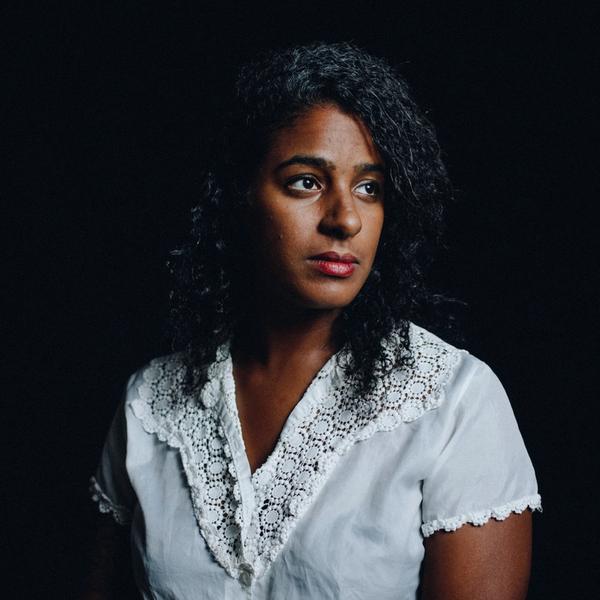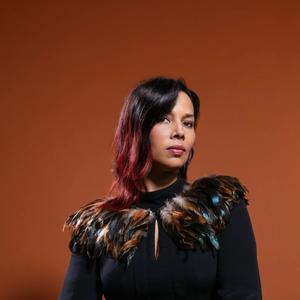




Link copied

While country music remains stubbornly wedded to a narrow set of aesthetic practices, Americana has often taken a more open-ended approach. What began as a rootsier alternative to the mainstream has expanded in recent years to include a vast swath of different sounds and styles, in the process becoming much more inclusive of voices that country music has historically marginalized.
For Leyla McCalla — a singer and multi-instrumentalist whose bonafides include recording and touring with The Carolina Chocolate Drops and co-founding Our Native Daughters with Rhiannon Giddens, Allison Russell and Amythyst Kiah — these are welcome changes. In her solo work, McCalla is as apt to draw from trad jazz and zydeco as from folk and old-time, treating her cello and tenor banjo as portals to vastly different musical worlds. The daughter of Haitian immigrants and human rights activists, McCalla also draws deeply from Haitian folk music, taking inspiration from styles like rara and twoubadou and frequently singing in Creole.
On Breaking the Thermometer, her assured fourth LP, McCalla traces a fragmented history of Haiti, beginning in the present and working backwards. A companion of sorts to a theater performance commissioned by Duke University — who acquired the archives of Radio Haiti, the first independent radio station in Haiti, in 2016 — the album weaves voice recordings from new and historical interviews into traditional songs and original compositions.
The result is multilingual melange that offers an evocative and layered interrogation of identity, belonging and the freedoms that we too often take for granted. Holler spoke with McCalla about her creative process, the timeliness of her message and how she learned to embrace the different genre labels people put on her music.
Let’s talk about the title of the album, Breaking the Thermometer, which I understand takes its name from a proverb. Why did that resonate with you?
Sean Dominique, who was the director of Radio Haiti until he was assassinated in 2000, used that metaphor to describe the role of the independent press in a free society. He was saying that the press is the thermometer of the people. You can crack down on the press, you can repress freedom of speech, but it won’t hide the fever — it won’t fix any of the underlying problems.
I love that proverb, because I feel like it sums up the research I was doing on Radio Haiti and also speaks to the human rights violations and attacks on democracy that continue to happen in Haiti and around the world.
Why did you feel like the story of Radio Haiti was important to tell at this particular moment?
In the United States, we tend to think of ourselves as immune from the struggles with the Democratic process that have afflicted places like Haiti. We like to think of ourselves as very far away from things that happen in so-called “shithold countries” — to use a phrase that we’re all familiar with. But if the Trump years taught us anything, it’s that we’re not.
We need to recognize that we’re not immune from losing our freedom of speech or otherwise having our civil rights violated, and I feel that the story of Radio Haiti helps us to see our vulnerabilities as well as our strength as people.
There are stories of incredible suffering on the album as well as moments of joy and hope. Why was it important for you to tell both sides of this story?
There hasn’t been a lot of space for nuance in U.S. media and the Western imagination. In the early part of the 20th century, Hollywood films depicted voodoo — which I feel is the ultimate expression of Haitian spirituality — as “black magic”, something evil and bad.
Then during the AIDS epidemic in the 80s, the CDC said that there were “Four H’s” that increased your risk of contracting HIV: hemophiliacs, heroin addicts, homosexuals and Haitians. Throughout its history, Haiti has been subject to a misinformation campaign that’s really tied up in racism.
In the last 10 years, I’ve been part of a movement of people in New Orleans who are trying to acknowledge the Haitian roots of a lot of our cultural traditions here. Haiti is a big part of U.S. history and continues to be, but we never think of it that way.
I also just think that Haiti is beautiful in an extremely nuanced way, in the same way that the United States is beautiful in a nuanced way. There is so much activism and resistance happening at every level of society, and I find that fascinating.
How did you approach turning these historical records into songs?
It’s been a super intuitive process of listening to the material and pulling out the elements that are interesting to me. Sometimes it takes the form of actual music recordings, and other times it’s just the sound of someone’s voice or a particular phrase that catches my attention.
I’m not a fluent Haitian creole speaker, so I’ve often had to listen over and over again and really work through what was being said. I’d basically take what I heard and what I felt like I could play along with on my instruments, and that became the basis for the songs. It’s been a lot of experimenting and feeling the natural curves of the music.
One thing I find interesting about this album is how much it pushes against and expands the sonic boundaries of what is considered Americana. Is that something you set out to do?
For me, making music is very intuitive. I wasn’t thinking, I want to expand what Americana is. Honestly, I find it remarkable that this music is considered Americana, and I think that’s more reflective of the times than it is necessarily of the music. Genre lines seem to be getting blurrier, and there are also strategic things that the industry is doing to make the listenership more inclusive. They know that more people need to see themselves in this music, and that means it has to include more than just white guys with guitars.
I feel like I still think like a folk musician, even if I’m using electric guitars and a drumset and evolving to a much bigger sound. That's the heart of where we’re coming from, and maybe being so inspired by different folk traditions and traditions in Haiti is what makes it Americana.
The other thing is, people will just call your music whatever they want to call it, and I’m coming around to the idea that it’s all good. Maybe none of it completely tells the story of what your music is, but that’s okay — none of it is wrong. I guess my thing is like, if I can fit into your categories, isn't that a good thing?
Your collaborative album with Rhiannon Giddens, Allison Russell and Amythyst Kiah, Songs of Our Native Daughters, was so important in changing the conversation about representation in Americana. What has that been like for you?
There has been way more acknowledgement of the role of Black women in country music and America since that record. In terms of what’s changed for me, the biggest thing is that more people want to talk to me about that, which wasn’t the case for most of my career. I'm proud that we played a role in creating the space for that. It’s a really important conversation, and I hope many more things come to light.
---
Breaking the Thermometer is out on Friday 6th May via Anti-.





